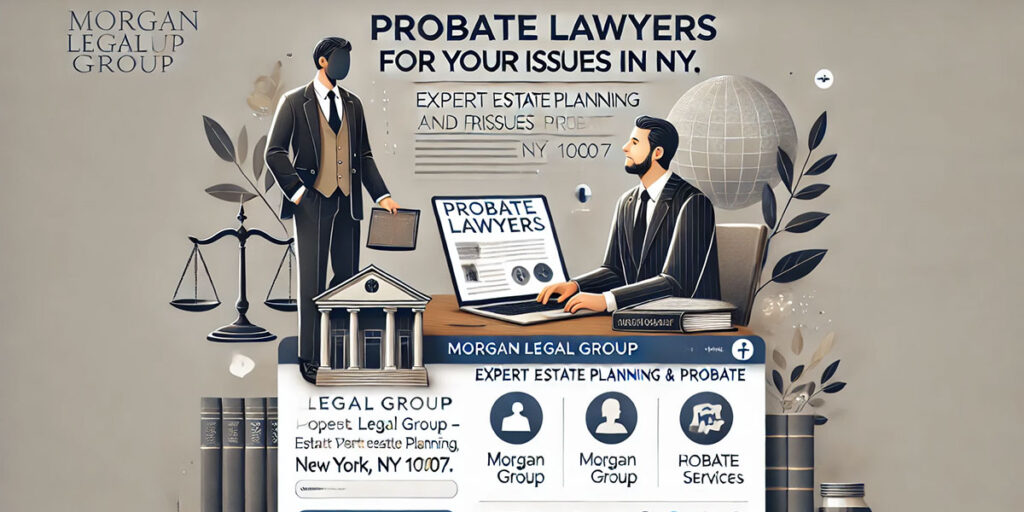Why You Should Let a Probate Lawyer Handle Your Probate Issues
Understanding the Probate Process in New York
Probate is a legal process that validates a deceased person’s will and oversees the distribution of their estate. In New York, probate is conducted through the Surrogate’s Court in the county where the deceased resided. While probate is often necessary to ensure a smooth transfer of assets, the process can be complicated, especially if disputes arise or the will is contested.
A probate lawyer provides invaluable assistance by navigating the legal complexities of probate, ensuring compliance with New York State laws, and minimizing delays and conflicts.
The Role of a Probate Lawyer
A probate lawyer specializes in estate administration and probate law. Their role includes:
- Validating the Will: Ensuring the will meets all legal requirements under New York law.
- Filing Probate Documents: Preparing and submitting the petition to the Surrogate’s Court.
- Managing Estate Assets: Assisting the executor in identifying, appraising, and securing estate assets.
- Handling Debts and Taxes: Ensuring that debts, taxes, and other obligations are settled appropriately.
- Resolving Disputes: Mediating conflicts among heirs or beneficiaries and defending the will against challenges.
Common Probate Issues in New York
1. Will Contests
A will contest occurs when a beneficiary or interested party challenges the validity of the will. Common grounds include allegations of undue influence, fraud, or lack of testamentary capacity. A probate lawyer can provide legal representation to defend or contest a will.
2. Executor Mismanagement
Executors have a fiduciary duty to manage the estate responsibly. Allegations of mismanagement, such as failing to distribute assets or misusing estate funds, can lead to disputes. A probate lawyer ensures that executors fulfill their legal obligations and protects beneficiaries’ rights.
3. Complex Estate Assets
Estates with complex assets, such as multiple properties, business interests, or investments, require expert handling. A probate lawyer can assist in appraising and distributing these assets while minimizing tax implications.
Benefits of Hiring a Probate Lawyer
1. Expertise in New York Probate Law
Probate laws vary by state, and New York’s laws can be particularly intricate. A probate lawyer has the knowledge and experience to navigate these laws, ensuring that the estate is administered correctly.
2. Reducing Family Conflicts
Family disputes are common during probate, especially when emotions run high. A lawyer acts as an impartial third party, mediating disagreements and preventing conflicts from escalating.
3. Saving Time and Reducing Stress
Probate is often a lengthy and stressful process. A probate lawyer allows families to focus on grieving and healing by handling paperwork, court appearances, and negotiations.
4. Minimizing Legal and Financial Risks
Errors in probate can lead to legal complications and financial losses. A lawyer ensures that all legal requirements are met, protecting the estate and its beneficiaries from potential liabilities.
Steps in the Probate Process
1. Filing the Petition
The probate process begins with filing a petition in the Surrogate’s Court. The petitioner must provide the deceased’s death certificate, the original will (if available), and a list of heirs and beneficiaries.
2. Validating the Will
The court reviews the will to ensure it meets legal requirements. This includes verifying that the will was signed and witnessed correctly. If no will exists, the estate is distributed according to New York’s intestacy laws.
3. Appointing an Executor or Administrator
If the will names an executor, the court will issue letters of testamentary to authorize them to act on behalf of the estate. The court appoints an administrator to manage the estate in cases without a will.
4. Managing Estate Assets
The executor or administrator must inventory the estate’s assets, appraise their value, and secure them. This step ensures that assets are protected during the probate process.
5. Paying Debts and Taxes
The estate is responsible for settling any outstanding debts, including mortgages, loans, and credit card balances. The executor must also file final income tax returns and pay any estate taxes owed.
6. Distributing Assets
Once all debts and taxes are settled, the remaining assets are distributed to beneficiaries according to the will or intestacy laws. A probate lawyer ensures this process is carried out fairly and legally.
Frequently Asked Questions About Probate in New York
1. How Long Does Probate Take?
The duration of probate varies depending on the complexity of the estate and any disputes that arise. On average, probate in New York takes 9-18 months.
2. Can Probate Be Avoided?
Yes, certain strategies, such as creating a living trust, naming beneficiaries on accounts, or holding property jointly, can bypass probate. A probate lawyer can help you implement these strategies.
3. What Happens If There Is No Will?
If the deceased did not leave a will, their estate is distributed according to New York’s intestacy laws, which prioritize spouses and children.
Conclusion
The probate process can be overwhelming, especially during a time of grief. Hiring a probate lawyer ensures that your loved one’s estate is handled professionally and carefully, minimizing delays and conflicts. At Morgan Legal Group, our team of experienced probate lawyers in New York City is dedicated to guiding families through this challenging process.
Contact us today to schedule a consultation, and let us help you navigate the complexities of probate with confidence and ease.









